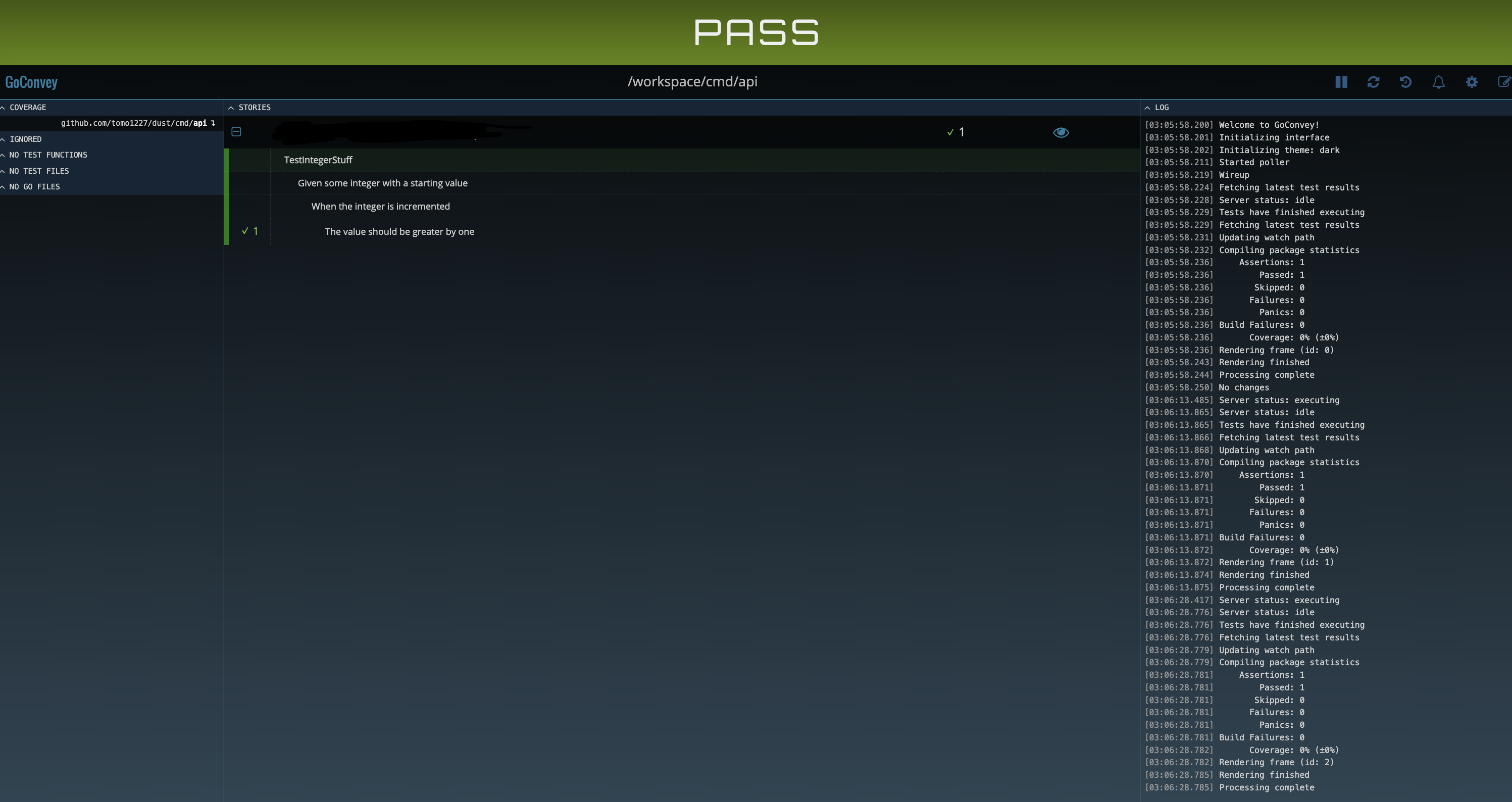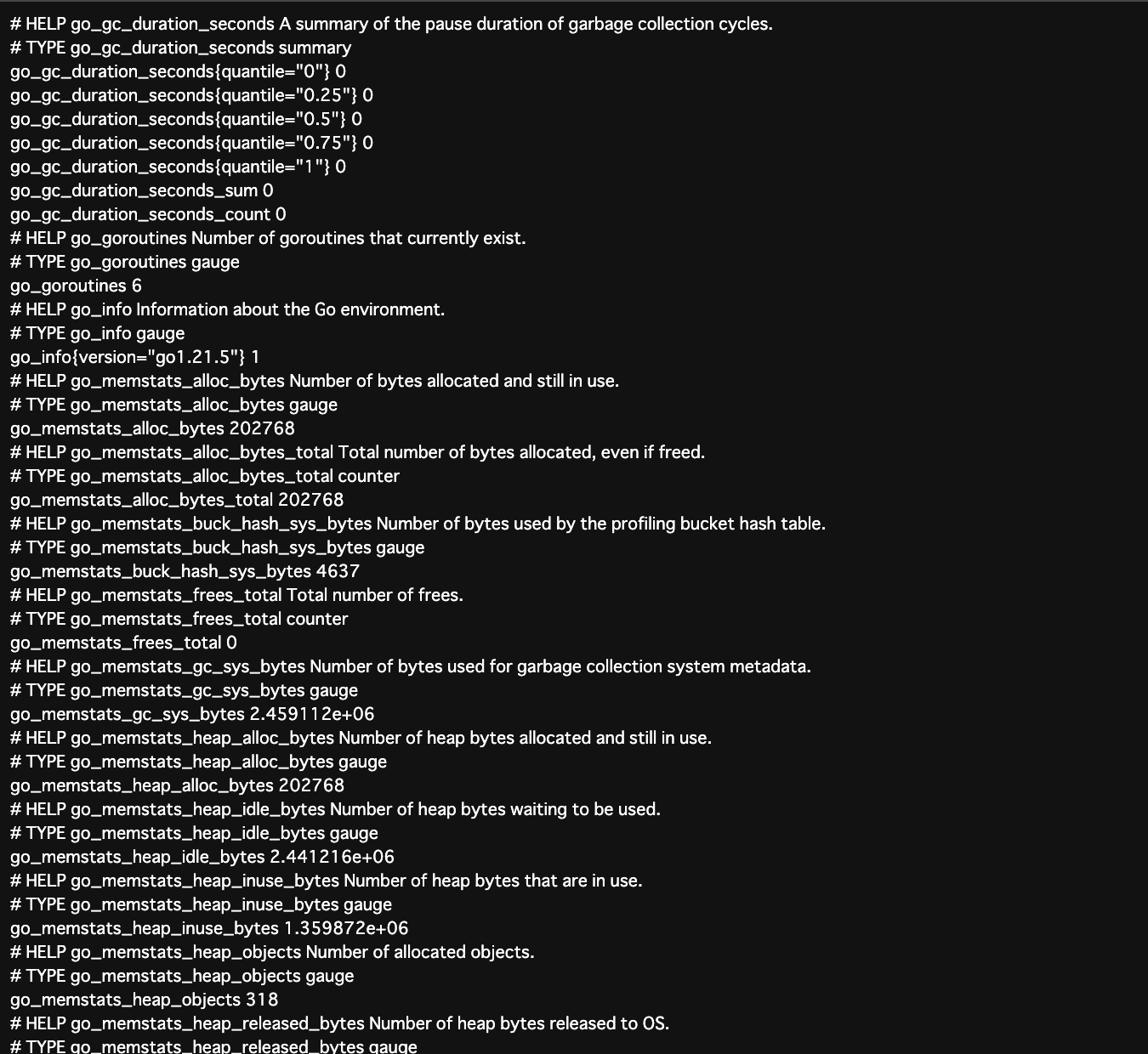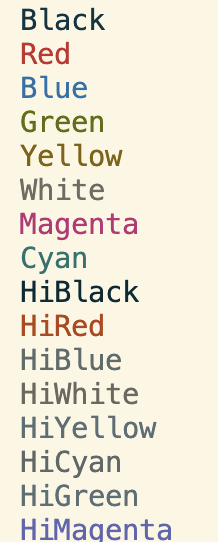Go言語ライブラリ15選
Golangのおすすめのライブラリを15個(+おまけ1個)紹介します。ライブラリの特徴、インストール方法、使い方を徹底解説していきます。
cmp
テストで等価性を調べるために使う標準ライブラリ。reflect.DeepEqualははオブジェクトが完全一致していないと false になるが、cmp を使うとスライスの順番を無視できたり、一部のフィールドを比較対象から除外したり、様々なオプションを追加することができる。また、diffで差分を出すこともできる。
package main
import (
"fmt"
"reflect"
"github.com/google/go-cmp/cmp"
"github.com/google/go-cmp/cmp/cmpopts"
)
func main() {
slice1 := []int{1, 2, 3}
slice2 := []int{2, 3, 1}
equal := reflect.DeepEqual(slice1, slice2)
fmt.Println("reflect.DeepEqual:", equal) // false
// cmpopts.SortSlices オプションを使用して、スライスの順序を無視して比較
options := cmpopts.SortSlices(func(a, b int) bool { return a < b })
diff := cmp.Diff(slice1, slice2, options)
fmt.Println("cmp.Diff:", diff) // 差分なし
equal2 := cmp.Equal(slice1, slice2, options)
fmt.Println("cmp.Equal:", equal2) // true
}
GoConvey
GoConveyを使うと、ブラウザ上でテスト結果を見ることができるようになる。また、テストを監視してくれるので、テスト結果もホットリロードされる。
$ cd <project path>
$ go get github.com/smartystreets/goconvey
$ go install github.com/smartystreets/goconvey
$ $GOPATH/bin/goconvey
http://localhost:8080 にブラウザにアクセスする。
docker内で起動している場合はgoconvey -host 0.0.0.0を叩かないと、ローカルのブラウザで起動できない。(gconvey in docker? · Issue #449 · smartystreets/goconvey)
以下のようにmain_test.goを作成する。
package main_test
import (
"testing"
. "github.com/smartystreets/goconvey/convey"
)
func TestIntegerStuff(t *testing.T) {
Convey("Given some integer with a starting value", t, func() {
x := 1
Convey("When the integer is incremented", func() {
x++
Convey("The value should be greater by one", func() {
So(x, ShouldEqual, 2)
})
})
})
}
再度、http://localhost:8080 にブラウザにアクセスすると、テストが更新されている。
protobuf
Protocol Buffers をgolangで使えるようにするライブラリ。
まず、 Protocol buffers のコンパイラをインストールする。以下はMacの場合。
Mac以外のやり方 : Protocol Buffer Compiler Installation | gRPC
brew install protobuf
protoc --version
golangコード自動生成用のプラグインをインストールする
go install google.golang.org/protobuf/cmd/protoc-gen-go@latest
syntax = "proto3";
package tutorial;
option go_package = "./protobuf/gen";
message Person {
string name = 1;
int32 age = 2;
}
protoc -I=protobuf --go_out=./ sample.proto
すると./protobuf/gen/ に以下のような sample.pb.goが自動生成される。
sample.pb.go
// Code generated by protoc-gen-go. DO NOT EDIT.
// versions:
// protoc-gen-go v1.32.0
// protoc v4.25.1
// source: sample.proto
package gen
import (
protoreflect "google.golang.org/protobuf/reflect/protoreflect"
protoimpl "google.golang.org/protobuf/runtime/protoimpl"
reflect "reflect"
sync "sync"
)
const (
// Verify that this generated code is sufficiently up-to-date.
_ = protoimpl.EnforceVersion(20 - protoimpl.MinVersion)
// Verify that runtime/protoimpl is sufficiently up-to-date.
_ = protoimpl.EnforceVersion(protoimpl.MaxVersion - 20)
)
type Person struct {
state protoimpl.MessageState
sizeCache protoimpl.SizeCache
unknownFields protoimpl.UnknownFields
Name string `protobuf:"bytes,1,opt,name=name,proto3" json:"name,omitempty"`
Age int32 `protobuf:"varint,2,opt,name=age,proto3" json:"age,omitempty"`
}
func (x *Person) Reset() {
*x = Person{}
if protoimpl.UnsafeEnabled {
mi := &file_sample_proto_msgTypes[0]
ms := protoimpl.X.MessageStateOf(protoimpl.Pointer(x))
ms.StoreMessageInfo(mi)
}
}
func (x *Person) String() string {
return protoimpl.X.MessageStringOf(x)
}
func (*Person) ProtoMessage() {}
func (x *Person) ProtoReflect() protoreflect.Message {
mi := &file_sample_proto_msgTypes[0]
if protoimpl.UnsafeEnabled && x != nil {
ms := protoimpl.X.MessageStateOf(protoimpl.Pointer(x))
if ms.LoadMessageInfo() == nil {
ms.StoreMessageInfo(mi)
}
return ms
}
return mi.MessageOf(x)
}
// Deprecated: Use Person.ProtoReflect.Descriptor instead.
func (*Person) Descriptor() ([]byte, []int) {
return file_sample_proto_rawDescGZIP(), []int{0}
}
func (x *Person) GetName() string {
if x != nil {
return x.Name
}
return ""
}
func (x *Person) GetAge() int32 {
if x != nil {
return x.Age
}
return 0
}
var File_sample_proto protoreflect.FileDescriptor
var file_sample_proto_rawDesc = []byte{
0x0a, 0x0c, 0x73, 0x61, 0x6d, 0x70, 0x6c, 0x65, 0x2e, 0x70, 0x72, 0x6f, 0x74, 0x6f, 0x12, 0x08,
0x74, 0x75, 0x74, 0x6f, 0x72, 0x69, 0x61, 0x6c, 0x22, 0x2e, 0x0a, 0x06, 0x50, 0x65, 0x72, 0x73,
0x6f, 0x6e, 0x12, 0x12, 0x0a, 0x04, 0x6e, 0x61, 0x6d, 0x65, 0x18, 0x01, 0x20, 0x01, 0x28, 0x09,
0x52, 0x04, 0x6e, 0x61, 0x6d, 0x65, 0x12, 0x10, 0x0a, 0x03, 0x61, 0x67, 0x65, 0x18, 0x02, 0x20,
0x01, 0x28, 0x05, 0x52, 0x03, 0x61, 0x67, 0x65, 0x42, 0x10, 0x5a, 0x0e, 0x2e, 0x2f, 0x70, 0x72,
0x6f, 0x74, 0x6f, 0x62, 0x75, 0x66, 0x2f, 0x67, 0x65, 0x6e, 0x62, 0x06, 0x70, 0x72, 0x6f, 0x74,
0x6f, 0x33,
}
var (
file_sample_proto_rawDescOnce sync.Once
file_sample_proto_rawDescData = file_sample_proto_rawDesc
)
func file_sample_proto_rawDescGZIP() []byte {
file_sample_proto_rawDescOnce.Do(func() {
file_sample_proto_rawDescData = protoimpl.X.CompressGZIP(file_sample_proto_rawDescData)
})
return file_sample_proto_rawDescData
}
var file_sample_proto_msgTypes = make([]protoimpl.MessageInfo, 1)
var file_sample_proto_goTypes = []interface{}{
(*Person)(nil), // 0: tutorial.Person
}
var file_sample_proto_depIdxs = []int32{
0, // [0:0] is the sub-list for method output_type
0, // [0:0] is the sub-list for method input_type
0, // [0:0] is the sub-list for extension type_name
0, // [0:0] is the sub-list for extension extendee
0, // [0:0] is the sub-list for field type_name
}
func init() { file_sample_proto_init() }
func file_sample_proto_init() {
if File_sample_proto != nil {
return
}
if !protoimpl.UnsafeEnabled {
file_sample_proto_msgTypes[0].Exporter = func(v interface{}, i int) interface{} {
switch v := v.(*Person); i {
case 0:
return &v.state
case 1:
return &v.sizeCache
case 2:
return &v.unknownFields
default:
return nil
}
}
}
type x struct{}
out := protoimpl.TypeBuilder{
File: protoimpl.DescBuilder{
GoPackagePath: reflect.TypeOf(x{}).PkgPath(),
RawDescriptor: file_sample_proto_rawDesc,
NumEnums: 0,
NumMessages: 1,
NumExtensions: 0,
NumServices: 0,
},
GoTypes: file_sample_proto_goTypes,
DependencyIndexes: file_sample_proto_depIdxs,
MessageInfos: file_sample_proto_msgTypes,
}.Build()
File_sample_proto = out.File
file_sample_proto_rawDesc = nil
file_sample_proto_goTypes = nil
file_sample_proto_depIdxs = nil
}
ちなみに、protobufは主にgRPCを実装する際に使われる。
参考 : gRPC公式ドキュメント
goose
goose は、GolangのMigrationツール。
go install github.com/pressly/goose/v3/cmd/goose@latest
今回はMySQLに接続してみる。
goose mysql "$DB_USER:$DB_PASS@tcp($DB_HOST)/$DB_TABLE" status
$ goose create init sql
2024/01/03 02:33:01 Created new file: 20240103023301_init.sql
.
├── 20240103023301_init.sql
├── go.mod
├── go.sum
└── main.go
上記でできたSQLファイルを下記のように編集します。
-- +goose Up
CREATE TABLE user (
id int NOT NULL,
name text,
age int,
PRIMARY KEY(id)
);
-- +goose Down
DROP TABLE user;
-- +goose Upの下にupするときの動作、-- +goose Downの下にDownした際の動作を実装する。
$ goose mysql "$DB_USER:$DB_PASS@tcp($DB_HOST)/$DB_TABLE" up
2024/01/03 06:26:10 OK 20240103061927_init.sql (16.55ms)
2024/01/03 06:26:10 goose: successfully migrated database to version: 20240103061927
$ goose mysql "$DB_USER:$DB_PASS@tcp($DB_HOST)/$DB_TABLE" status
2024/01/03 06:26:19 Applied At Migration
2024/01/03 06:26:19 =======================================
2024/01/03 06:26:19 Wed Jan 3 15:26:10 2024 -- 20240103061927_init.sql
userテーブルが作成されている。
mysql> show tables;
+------------------+
| Tables_in_dust |
+------------------+
| goose_db_version |
| user |
+------------------+
2 rows in set (0.00 sec)
mysql> desc user;
+-------+------+------+-----+---------+-------+
| Field | Type | Null | Key | Default | Extra |
+-------+------+------+-----+---------+-------+
| id | int | NO | PRI | NULL | |
| name | text | YES | | NULL | |
| age | int | YES | | NULL | |
+-------+------+------+-----+---------+-------+
3 rows in set (0.00 sec)
$ goose mysql "$DB_USER:$DB_PASS@tcp($DB_HOST)/$DB_TABLE" down
2024/01/03 06:27:52 OK 20240103061927_init.sql (15.89ms)
downするとuserテーブルがdropされる。
mysql> show tables;
+------------------+
| Tables_in_dust |
+------------------+
| goose_db_version |
+------------------+
1 row in set (0.00 sec)
fsnotify
fsnotifyは、ファイル監視ライブラリ。
以下のコマンドでインストールする
go get github.com/go-fsnotify/fsnotify
package main
import (
"log"
"github.com/fsnotify/fsnotify"
)
func main() {
// Create new watcher.
watcher, err := fsnotify.NewWatcher()
if err != nil {
log.Fatal(err)
}
defer watcher.Close()
// Start listening for events.
go func() {
for {
select {
case event, ok := <-watcher.Events:
if !ok {
return
}
log.Println("event:", event)
if event.Has(fsnotify.Write) {
log.Println("modified file:", event.Name)
}
case err, ok := <-watcher.Errors:
if !ok {
return
}
log.Println("error:", err)
}
}
}()
// Add a path.
err = watcher.Add("/tmp")
if err != nil {
log.Fatal(err)
}
// Block main goroutine forever.
<-make(chan struct{})
}
実行するとファイルの変更を監視してくれる。
$ go run main.go
2024/01/02 14:06:57 event: CREATE "/tmp/go.1bf98f8185591c288e01bd9fb67907933818eb97559717d6f839f041449e0f35.3807461520.mod"
2024/01/02 14:06:57 event: WRITE "/tmp/go.1bf98f8185591c288e01bd9fb67907933818eb97559717d6f839f041449e0f35.3807461520.mod"
・・・・
air
airはホットリロードを可能にするパッケージ。
以下はGinを使った例である。
go install github.com/cosmtrek/air@latest
.air.tomlに設定
root = "."
testdata_dir = "test"
tmp_dir = "tmp"
[build]
args_bin = []
bin = "./tmp/main"
cmd = "go build -o ./tmp/main ."
delay = 1000
exclude_dir = ["assets", "tmp", "vendor", "test"]
exclude_file = []
exclude_regex = ["_test.go"]
exclude_unchanged = true
follow_symlink = true
full_bin = ""
include_dir = []
include_ext = ["go", "tpl", "tmpl", "html"]
kill_delay = 500 #ms
log = "air.log"
send_interrupt = false
stop_on_error = true
[color]
# Customize each part's color. If no color found, use the raw app log.
app = ""
build = "yellow"
main = "magenta"
runner = "green"
watcher = "cyan"
[log]
# Show log time
time = true
[misc]
# Delete tmp directory on exit
clean_on_exit = true
[screen]
clear_on_rebuild = false
package main
import "github.com/gin-gonic/gin"
func main() {
r := gin.Default()
r.GET("/hello", func(c *gin.Context) {
c.JSON(200, gin.H{
"message": "Hello World!",
})
})
r.Run()
}
以下コマンドでホットリロード可能なサーバが起動する。
$ air
pretty
Golangにおける pretty-print。
pretty.Formatter()を使うと綺麗に整列してくれる。
package main
import (
"fmt"
"github.com/kr/pretty"
)
func main() {
type myType struct {
a, b int
}
var x = []myType{{1, 2}, {3, 4}, {5, 6}}
fmt.Printf("%# v\n", x)
fmt.Printf("%# v", pretty.Formatter(x))
}
[]main.myType{main.myType{a: 1, b: 2}, main.myType{a: 3, b: 4}, main.myType{a: 5, b: 6}}
[]main.myType{
{a:1, b:2},
{a:3, b:4},
{a:5, b:6},
}
cli
cli は、Golangでコマンドラインツールを構築するための、シンプルで高速なパッケージ。
package main
import (
"fmt"
"os"
"github.com/urfave/cli/v2"
)
func main() {
app := &cli.App{
Name: "HelloCLI",
Usage: "A simple Hello, World! CLI application",
Commands: []*cli.Command{
{
Name: "greet",
Aliases: []string{"g"},
Usage: "Greet someone",
Flags: []cli.Flag{
&cli.StringFlag{
Name: "name",
Aliases: []string{"n"},
Value: "World",
Usage: "Specify the name for the greeting",
},
},
Action: func(c *cli.Context) error {
name := c.String("name")
fmt.Printf("Hello, %s!\n", name)
return nil
},
},
},
}
err := app.Run(os.Args)
if err != nil {
fmt.Println(err)
}
}
このコマンドを実行してみる。
$ go run main.go greet --name Alice
Hello, Alice!
cobra
簡単にCLIを実装できるライブラリ
ただし、cobra cliがgo workspaceに対応していない。(すでにPRはあるが、まだ取り込まれていない)
go install github.com/spf13/cobra-cli@latest
go get -u github.com/spf13/cobra@latest
cobra-cli initするとcmdディレクトリとmain.goが生成される。
$ cobra-cli init
$ tree .
.
├── cmd
│ └── root.go
├── go.mod
├── go.sum
├── main.go
cobra-cli add xxxで xxxコマンド を作成してくれる。
$ cobra-cli add hello
$ tree cmd
cmd
├── hello.go
└── root.go
自動生成されたcmd/hello.goに helloコマンド の処理を追加する。
/*
Copyright © 2024 NAME HERE <EMAIL ADDRESS>
*/
package cmd
import (
"fmt"
"github.com/spf13/cobra"
)
var helloCmd = &cobra.Command{
Use: "hello",
Short: "This is hello command.",
Long: `This is hello command.`,
Run: func(cmd *cobra.Command, args []string) {
// ここにコマンドの処理をかく
fmt.Println("Hello world!")
},
}
func init() {
rootCmd.AddCommand(helloCmd)
}
helloコマンドを実行する。
$ go run main.go hello
Hello world!
viper
viper は toml, yaml, jsonなどの設定ファイルから環境変数を読み込むライブラリである。
実際に以下のtomlファイルから設定値を取得する。
go get github.com/spf13/viper
go get github.com/pelletier/go-toml # tomlの場合
go get gopkg.in/yaml.v2 # yamlの場合
message = "Hello TOML!"
package main
import (
"fmt"
"github.com/spf13/viper"
)
func main() {
viper.SetConfigName("config") // 設定ファイル名を指定
viper.SetConfigType("toml") // 設定ファイルの形式を指定
viper.AddConfigPath(".") // ファイルのpathを指定
// 設定ファイルの読み込み
err := viper.ReadInConfig()
if err != nil {
panic(fmt.Errorf("fatal error config file: %w", err))
}
// キーが "message" の値を取得
message := viper.GetString("message")
fmt.Println("message :", message)
}
実行すると
$ go run main.go
message : Hello TOML!
wire
Golangの依存性注入(DI)のライブラリ。
wireは更新少ない、genericsに対応していないという理由から、sambor/doの方がいいかも知れない。
go install github.com/google/wire/cmd/wire@latest
まず、以下のようにmain.goとwire.goを作成する。
package main
import "fmt"
func main() {
greeter := InitializeGreeter()
message := greeter.Greet()
fmt.Println(message)
}
//go:build wireinject
// +build wireinject
package main
import (
"github.com/google/wire"
)
type Message string
func NewMessage() Message {
return "Hello, Wire!"
}
func NewGreeter(m Message) Greeter {
return Greeter{Message: m}
}
type Greeter struct {
Message Message
}
func (g Greeter) Greet() Message {
return g.Message
}
func InitializeGreeter() Greeter {
wire.Build(NewMessage, NewGreeter)
return Greeter{}
}
wire.goのあるディレクトリでwireと叩くとwire_gen.goが自動生成される。
wire_gen.go
// Code generated by Wire. DO NOT EDIT.
//go:generate go run github.com/google/wire/cmd/wire
//go:build !wireinject
// +build !wireinject
package main
// Injectors from wire.go:
func InitializeGreeter() Greeter {
message := NewMessage()
greeter := NewGreeter(message)
return greeter
}
// wire.go:
type Message string
func NewMessage() Message {
return "Hello, Wire!"
}
func NewGreeter(m Message) Greeter {
return Greeter{Message: m}
}
type Greeter struct {
Message Message
}
func (g Greeter) Greet() Message {
return g.Message
}
fasthttp
Go 用の高速 HTTP 実装であり、net/http よりも最大10倍高速らしい。
go get github.com/valyala/fasthttp
簡単なサーバを起動してみる。
package main
import (
"fmt"
"github.com/valyala/fasthttp"
)
func requestHandler(ctx *fasthttp.RequestCtx) {
fmt.Printf("Hello World!\n")
}
func main() {
server := fasthttp.Server{
Handler: requestHandler,
}
// ポート8080でサーバを起動
err := server.ListenAndServe(":8080")
if err != nil {
fmt.Println("Error starting server:", err)
}
}
$ go run main.go &
$ curl http://localhost:8080
Hello World!
prometheus
Prometheus は、モニタリング用のメトリクスを計測するためのライブラリ。メトリクスの登録、HTTP経由での公開(promhttpパッケージ)、プッシュゲートウェイへのプッシュ(pushパッケージ)などができる。
go get github.com/prometheus/client_golang/prometheus
go get github.com/prometheus/client_golang/prometheus/promauto
go get github.com/prometheus/client_golang/prometheus/promhttp
package main
import (
"net/http"
"github.com/prometheus/client_golang/prometheus/promhttp"
)
func main() {
http.Handle("/metrics", promhttp.Handler())
http.ListenAndServe(":8080", nil)
}
サーバを起動。
go run main.go
http://localhost:8080/metrics にアクセスすると以下のような画面が表示される。
logrus
logrus は、有名なロギングライブラリ。
package main
import (
log "github.com/sirupsen/logrus"
)
func main() {
// ログフィールドの設定
log.WithFields(log.Fields{
"id": "001",
"size": 10,
}).Info("start logrus")
// ログのレベルを変更して出力
log.SetLevel(log.DebugLevel)
log.Debug("hello world")
log.Error("error")
log.SetFormatter(&log.JSONFormatter{})
log.Info("json format")
}
これを実行すると、以下のようになる。
$ go run main.go
INFO[0000] start logrus id=001 size=10
DEBU[0000] hello world
ERRO[0000] error
{"level":"info","msg":"json format","time":"2024-01-02T17:32:08Z"}
color
colorを使うと、ターミナルに色付きで出力できる。 他にもアンダーラインや太字、背景色の変更もできる。
go get github.com/fatih/color
実際に文字に色をつけてみた。
package main
import (
"github.com/fatih/color"
)
func main() {
color.Black("Black")
color.Red("Red")
color.Blue("Blue")
color.Green("Green")
color.Yellow("Yellow")
color.White("White")
color.Magenta("Magenta")
color.Cyan("Cyan")
color.HiBlack("HiBlack")
color.HiRed("HiRed")
color.HiBlue("HiBlue")
color.HiWhite("HiWhite")
color.HiYellow("HiYellow")
color.HiCyan("HiCyan")
color.HiGreen("HiGreen")
color.HiMagenta("HiMagenta")
}
go run main.go をすると
Go kit (おまけ)
Go言語でマイクロサービスを構築するためのツール。
16個目になったので、おまけです。
Go kitについての実装例は、長くなりそう、私自身がまだ使ったことがない、といった理由から、割愛させてください。以下2つの記事が参考になります。1つ目は公式チュートリアルで、2つ目は実際にTODOアプリを作成する記事。
最後に
以下のサイトにジャンル別でライブラリやフレームワークが大量にまとまっている。
avelino/awesome-go: A curated list of awesome Go frameworks, libraries and software


